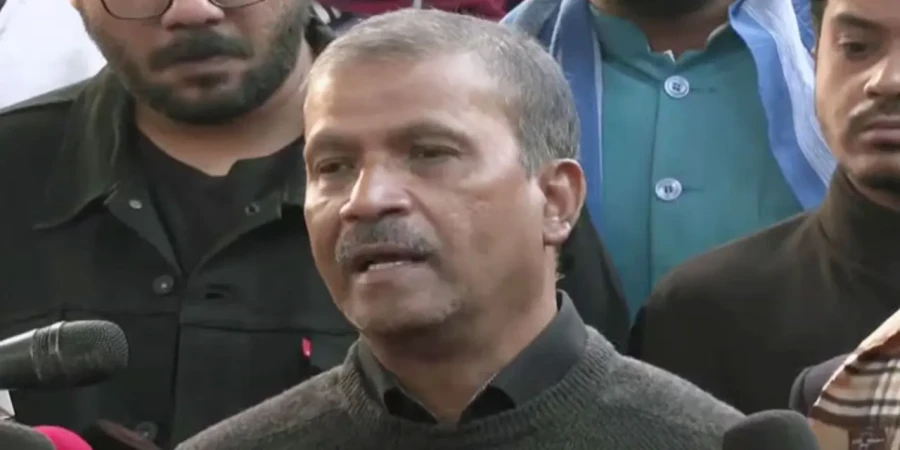
ছবি: Adviser for Law, Professor Dr. Asif Nazrul, paying tribute at the Mirpur Martyred Intellectuals Memorial. Photo: Collected.
On Saturday, marking Martyred Intellectuals Day, Dr. Asif Nazrul, Interim Government's Adviser for Law and Parliamentary Affairs, emphasized the importance of utilizing the nation's second chance for rebuilding and ensuring the sacrifices of the martyred intellectuals are not in vain. Speaking to journalists after paying homage at the Martyred Intellectuals Memorial in Mirpur, he reflected on the significance of their contributions and the necessity of continuing their ideals to realize the dream of a progressive, equitable society.
Dr. Nazrul highlighted that the sacrifices made during the Liberation War, particularly by the intellectuals, were carried forward in the recent July uprising, where young people and students courageously stood up for democracy, human rights, and a society free from inequality and oppression. He stated that the responsibility now lies with the nation to ensure that this opportunity to build a better state is not squandered.
"The intellectuals who sacrificed their lives for this country envisioned a nation based on justice, democracy, and equality. After their loss, we had failed to fulfill that vision due to political shortcomings and monopolistic attitudes," said Dr. Nazrul. "Now that we have been granted a second chance to restructure the nation, we must remain vigilant and not repeat the failures of the past."
Earlier in the morning, President Mohammad Shahabuddin and Interim Government’s Chief Adviser, Professor Dr. Muhammad Yunus, paid their respects at the Mirpur Martyred Intellectuals Memorial at 7:05 AM, commemorating the nation’s greatest minds who lost their lives to a calculated and brutal plan to strip the country of its intellectual leadership.
On December 14, 1971, just two days before Bangladesh achieved its long-awaited victory, collaborators of the occupying Pakistani forces, including Razakars, Al-Badr, Al-Shams, and members of the Peace Committee, initiated a systematic campaign of abduction and killing. Their target was the intellectual class — academics, journalists, doctors, engineers, artists, lawyers, and other professionals who formed the backbone of the society.
The perpetrators carried out the brutal massacres under the cover of the curfew imposed by martial law. Intellectuals were abducted from their homes, blindfolded, and taken to unknown locations. Later, their lifeless bodies were discovered in desolate areas such as the marshes of Mirpur and the brick fields of Rayerbazar.
Eyewitnesses reported seeing bodies with bullet wounds, signs of gruesome torture, and physical mutilation. Many victims were tied up, blindfolded, and stabbed with bayonets. In some cases, their intestines were left exposed, highlighting the barbarity inflicted upon them. The tragic discovery of their bodies shocked a nation poised on the brink of independence and left families and communities devastated.
Reports published in newspapers in 1972 and historical accounts, including a feature by journalist Nicholas Tomalin in the Newsweek magazine, confirmed that the number of martyred intellectuals exceeded 1,070. The massacre of the intellectuals was not random; it was a deliberate strategy by the Pakistani occupation forces to render the emerging nation intellectually crippled. They recognized that killing the country's intellectual leadership would make it more difficult for Bangladesh to recover and rebuild as a free state.
The killings were carried out with the assistance of Al-Badr, a paramilitary group composed of local collaborators, who abducted prominent intellectuals from their homes under the pretense of law enforcement. Witnesses and survivors later revealed the names of victims, which included some of the brightest minds of the time. Notable figures such as Professor Munier Chowdhury, Dr. Alim Chowdhury, Dr. Fazle Rabbi, journalist Sirajuddin Hossain, writer Shahidullah Kaiser, Professor Jyotirmoy Guhathakurta, and artist Altaf Mahmud were among the fallen intellectuals.
The two primary locations that became synonymous with the intellectual genocide are the Mirpur killing fields and the Rayerbazar brick kiln. Today, these sites stand as memorials to the tragedy, preserving the memory of the countless lives lost and serving as reminders of the cost of freedom.
Reflecting on the historical events, Professor Muhammad Yunus stated during his tribute that the intellectual killings marked one of the darkest chapters in Bangladesh’s history. He emphasized that the aim of the Pakistani forces and their collaborators was to seek vengeance through an act of unparalleled cruelty and to deprive Bangladesh of the leadership it would need to establish itself as an independent nation.
He added, "The sacrifices of the intellectuals, alongside the courage of our youth during the Liberation War, are the foundation of our freedom. We must honor their memory by building a nation where democracy, justice, and equality prevail.”
The government has undertaken various programs to observe Martyred Intellectuals Day with due respect. Political parties, social organizations, and cultural groups have also planned events to mark the occasion. Ceremonies, discussions, and prayer gatherings will be held nationwide to commemorate the intellectuals who made the ultimate sacrifice.
The Liberation War, which spanned nine long and painful months, saw millions of Bangladeshis lay down their lives for the dream of an independent state. By December 1971, the victory seemed inevitable, yet the killing of the intellectuals on the eve of liberation remains a testament to the cruelty and calculated strategy of the occupying forces. The aim was clear: to cripple the new nation by removing its intellectual and cultural leadership.
Dr. Asif Nazrul’s remarks served as a poignant reminder that the nation's journey toward rebuilding is far from over. "We must remember that the ultimate goal of the martyred intellectuals was to see a free, fair, and prosperous Bangladesh. It is our duty to uphold their values and ensure that their dreams for this country are realized,” he said.
The sacrifices of Bangladesh's intellectuals have been etched into the country's history as a symbol of resilience and courage. As the nation observes Martyred Intellectuals Day, it not only pays tribute to those who lost their lives but also renews its commitment to building a Bangladesh worthy of their sacrifices.
repoter






